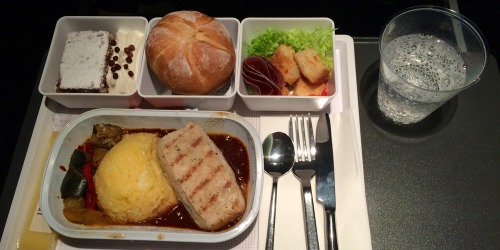Muslims around the world form a growing cohort of travellers, making up for a considerable portion of the global traveller base.
Key factors such as rising wealth and disposable income, and a spirited Gen Z tourist base is propelling Muslim travel, prompting airlines to court this promising passenger segment. This includes respecting their religious obligations.
Muslim-majority countries
Travellers, for the most part, assume that on-board Muslim meals served by airlines operating out of Muslim-majority countries would be halal.
But the key question remains: Are they halal-certified?
Dubai-based Emirates says on its website that all of its meals are ‘halal-certified’. Etihad Airways, headquartered in the neighbouring emirate of Abu Dhabi, says all food served on board is prepared ‘in strict compliance with halal regulations and is suitable for Muslims’. In Qatar, the national carrier also states that all meals are ‘halal’.
“Flight meals that are prepared in compliance with halal guidelines are not necessarily halal-certified. They may or may not have the requisite certifications. However, various [regional] airlines do offer meals that are halal certified, like Emirates, Etihad Airways, Qatar Airways, Saudia and Oman Air," Zeeshan Abdul Aziz, CEO of International Halal Certification told Salaam Gateway.
Bahrain’s Gulf Air offered an assurance on its website, stating that there remains no need to request for a Muslim meal as all food served on airline-operated flights is ‘halal’.
Halal certification is the process through which an independent entity supervises and verifies a product, attesting that it was produced in conformity with Islamic laws. The certification is typically granted by Islamic certification bodies or organizations that have the expertise to assess and confirm the halal conformity of products.
Outside of the GCC region, Malaysia Airlines, one of Asia’s largest carriers, notes that all meals served on board are halal-certified and prepared in strict compliance to halal requirements.
“However, if you are a Muslim passenger flying with one of our codeshare partners, you are advised to request for Muslim meals,” the airline states on its website.
Turkish Airlines states that there is no need to create a demand for Muslim food because the meals served on its flights are prepared according to Islamic methods.
“Several airlines claim that they prepare products in compliance with halal regulations, though they are not halal-certified. Like Turkish Airlines ensures it does not handle pork in the same facility,” said Abdul Aziz.
Non-Muslim countries
Singapore Airlines’ Muslim meal served on board its flights is prepared without the use of pork, lard or alcohol, and the ingredients used are sourced from halal-certified suppliers, a Singapore Airlines spokesperson told Salaam Gateway.
“The meals are not halal-certified as the serviceware used are not separated for various types of meals available on board,” the spokesperson added.
Hong-Kong headquartered Cathay Pacific states that its Muslim meal contains no pork and pig by-products, gelatine, non-halal fish from species without scales or fins, alcohol and flavouring extracts with alcohol.
However, ‘all meals on flights to and from Bangladesh, Indonesia, Malaysia and [the] Middle East are prepared according to the halal method’, the airline said on its website.
Moving towards Europe, all meat and poultry products used in the preparation of a Muslim meal on Lufthansa-operated flights are certified as slaughtered according to halal guidelines. No pork or game is used, as well as no alcohol.
UK’s flag carrier British Airways states that its halal meal is prepared in accordance with halal guidelines.
“It uses halal meat and does not contain pork, alcohol or derivatives of these products,” it said. But the airline offers no information on whether the meals are halal-certified or not.
But why is certification so important? One of the major advantages is that a growing number of Muslims travellers who are looking for halal-certified meals on flights feel more satisfied when they are served such food, explained Abdul Aziz.
Monique Naval, senior research analyst at Euromonitor International added that people are more conscious than ever about where their food comes from, and Muslim consumers are no exception.
“Islamic beliefs dictate Muslims’ dining preferences, and they are ethically conscious regarding halal accreditation; halal certification provides assurance that they adhere to Islamic laws. As such, offering halal-certified food on flights allows airlines to build rapport among Muslim travellers and boost consumer confidence,” she said.
In the ascendant
Muslims form a sizeable chunk of the global traveller base, with Muslim international arrivals expected to reach between 164 to 168 million this year, exceeding pre-pandemic levels by as much as 3-5%, the Mastercard-CrescentRating Global Muslim Travel Index 2024 stated.
.jpg) “This growth trend is expected to continue, with projections showing that Muslim international arrivals could reach 230 million by 2028, accompanied by an estimated expenditure of $225 billion,” the report suggested.
“This growth trend is expected to continue, with projections showing that Muslim international arrivals could reach 230 million by 2028, accompanied by an estimated expenditure of $225 billion,” the report suggested.
The projections illustrate the segment’s rising prominence, propelled by technological advancements, economic growth and tourism development.
"Halal remains under the spotlight as companies, including airlines, race to benefit from a pool of untapped consumers. Halal labelling provides assurance and a display of dedication to consumers,” said Naval.
For all the benefits surrounding halal certification, there are several issues impeding the process.
"Airlines prepare different types of meals depending on the regions they serve, hence there are hundreds of ingredients that are used. This makes the certification process more complex and detailed. Airlines have to source ingredients from different suppliers from all over the world, so to ensure the halal supply chain of each raw material is a big challenge," said Abdul Aziz.


